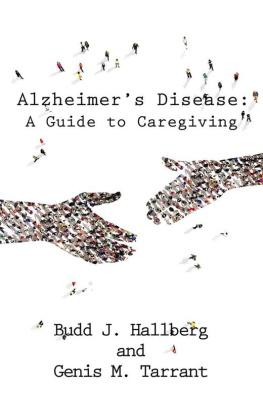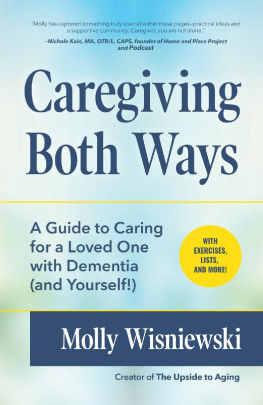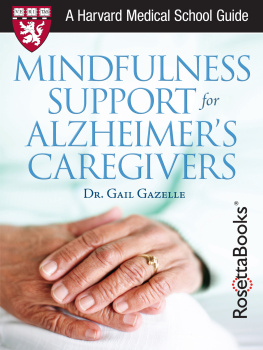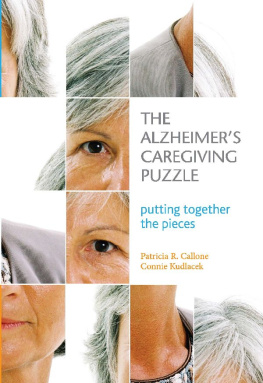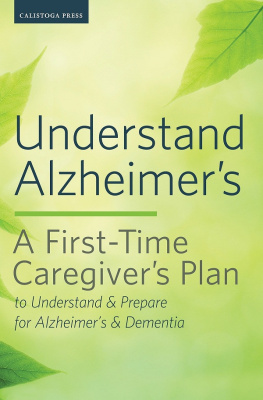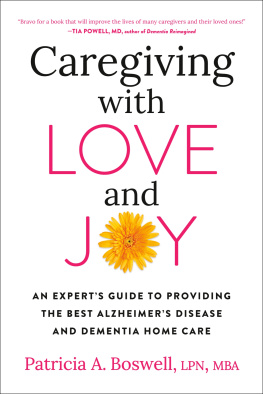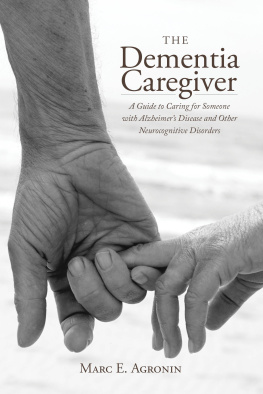ABOUT THE AUTHORS
Sandy Braff
Sandy Braff was born in Johannesburg, South Africa, and came to the USA in 1967. She has been a licensed marriage and family therapist (MFT), since 1984. She is in private practice in San Diego, California. She has dedicated her career to educating and counseling caregivers and family members of Alzheimers patients, guiding them to successfully adapt to the profound stressors of dealing with Alzheimers disease. Since 1989 she has voluntarily facilitated a weekly Alzheimers Caregivers Support Group for the San Diego Alzheimers Association. Sandy is also on the Speakers Bureau of the local association and has presented to many organizations on various topics related to Alzheimers disease and caregiving issues.
Mary Rose Olenik
As a staff research associate in the Department of Psychiatry at the University of California, San Diego, Mary Rose Olenik conducted over 300 interviews every six months with Alzheimers caregivers. Although the research study focused on stress as it affects immunity in the spousal caregiver, Mary Rose was profoundly impressed with the caregivers stories of courage, compassion, adaptation, and the paradox of staying connected while letting go, which were consequential to the data. Ms. Olenik recently moved to New Hampshire, where she plans to continue her work with caregivers and senior advocacy.
STAYING CONNECTED WHILE LETTING GO
The Paradox of Alzheimers Caregiving
Copyright 2003 by Sandy Braff and Mary Rose Olenik
All rights reserved. No part of this book may be reproduced or transmitted in any form or by any means without the written permission of the publisher.
M Evans
An imprint of Rowman & Littlefield
4501 Forbes Boulevard. Suite 200
Lanham, Maryland 20706
www.rowman.com
Distributed by NATIONAL BOOK NETWORK
Library of Congress Cataloguing-in-Publication Data
Braff, Sandy.
Staying connected while letting go : the paradox of alzheimers caregiving / by Sandy Braff and Mary Rose Olenik
p. cm.
ISBN 978-1-59077-068-9
1. Alzheimers disease. 2. Caregivers. 3. Self-care, Health. I. Olenik, Mary Rose. II. Title.
RC523. B725 2002
616.8'31dc21 200202731
Typesetting and design by Evan Johnston
Printed in the United States of America
To Caregivers everywhere-heroes and heroines all.
Day by day blossoms alter and fall; Year by year people transform and change Han-Shan
FOREWORD
Staying Connected While Letting Go: The Paradox of Alzheimer)s Caregiving, brings to life the challenges and triumphs of courageous individuals who care for their loved ones who are afflicted with Alzheimers disease. The authors shine an insightful, emotionally moving, and lyrical spotlight on a topic that is often ignored, minimized, or met with denial. They clearly articulate how caregivers can function as full human beings when so much of their energy is tied up in a relentless and inevitably losing battle with an unyielding enemy. Alzheimers inescapably progresses from the initial stages of dementia through deeper and deeper levels of dysfunction across cognitive and behavioral domains. The authors have masterfully described how even the tragedy of Alzheimers and the profoundly challenging tasks of caregiving can be transformed into a life-affirming process. The steps and strategies of this difficult process are illuminated in this outstanding book.
The wisdom and experience of the authors is subtly but distinctively infused throughout. The volume is structured by following caregivers and their loved ones through First Encounters-beginning stagesthrough Coming to Terms with the middle stages, and, finally, Nearing the Journeys End and beyond, which describes the final stage. This clever staging of the major parts of the book parallels the course of the illness itself as told through the experiences, thoughts, and emotions of caregivers. The book describes the first subtle (and frequently denied) clues that a loved one is suffering from a significant cognitive and memory disturbance. Next, it addresses the tears, panic, and fear of a confirmed diagnosis; then the isolation and abandonment that caregivers experience in the lengthy middle stages; and fmally the death of the spouse and the caregivers reflections on their own transformation. Throughout the book other themes evolvethat losses can be acknowledged and transcended; that denial and anger can be constructively met with adaptive strategies and even humor; that family and friends can unite to support one another and utilize external and internal resources in their quest for achieving peace and tranquility rather than suffering the alternatives of isolation, despair, and fragmentation.
Ms. Braffs experience as a marriage family therapist enables her to assist caregivers and to facilitate her weekly Alzheimers caregivers support group, with which she has been involved for fifteen continuous years. She is able to help caregivers integrate how hope and cognitive reframing can offer productive compensatory strategies for caregivers. Ms. Oleniks six-year experience performing in-home evaluations of Alzheimers caregivers in an important research project allows us to better understand the full impact of Alzheimers disease on caregivers in their day-to-day struggles.
For caregivers and their families, this book offers unique insights into the workings of progressive dementia and its all-encompassing attack on what makes us truly humanour memories of the past, our awareness of the present, and our ability to plan for the future. But through this veil of tears, the reader gradually learns adaptive strategies for dealing with his or her loved ones dementia and his or her own complex emotions from the earliest stages through mid and late disease states. The psychological approach includes the importance of early recognition and planning; developing a social support network; and adopting strategies for dealing with personal, legal, and ethical dilemmas. It is this rich vein of information and proven coping strategies that allows the reader to feel hopeful and inspired. Transforming fear into realistic planning and hope is not an easy prescription to write, but the authors have accomplished just that with kindness, compassion, reality testing, and proven adaptive strategies.
For caregivers, this book offers hope in the face of an unrelenting disease. For relatives and friends, it provides a deeper understanding of how they can help their loved ones in the depths of their despair. For the health professionals, who frequently see Alzheimers patients for thirty minutes or less a week, the book offers an invaluable, realistic picture of what day-to-day life is like for Alzheimers caregivers and their patients.
The authors have achieved an admirable and inspiring balance of realistic descriptions of the life and times of caregivers and a pathway by which survival and spiritual strength may be attained under difficult circumstances. Thus, for caregivers, their friends and family, and the medical and mental health communities, this book carries a compassionate but realistic and instructive message. It is a unique and inspiring message of hope and understanding. I recommend that all of the above groups who are touched by Alzheimers carefully read and learn from this sensitively written and profoundly valuable book.
Arnold A. Lazarus, Ph.D., ABPP
Distinguished Professor Emeritus of


